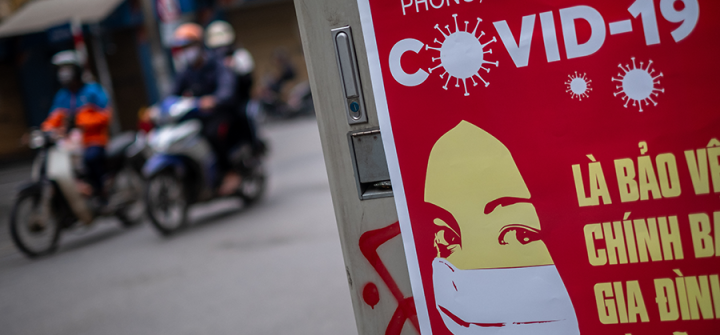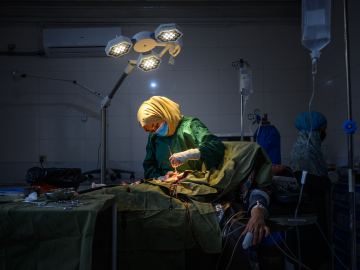COVID-19 Isn't Political; Its Response Shouldn't Be Politicized
A year after the first COVID-19 case was reported in Wuhan, China, few countries have fully contained the disease. Those that have share few, if any, political similarities.
Ranging from authoritarianism in China, to single-party socialism in Vietnam, to representative democracy in New Zealand, successful efforts to thwart the pandemic’s spread seem to rely less on politics, and more on national cooperation.
Meanwhile, in Western Europe democracies, Belgium’s hard lockdowns did not win strict public adherence, and Sweden’s laissez-faire policy did not achieve the hoped-for herd immunity. In the Americas, conservative leaders in the US and Brazil turned a blind eye to reality with their live-and-let-die philosophy. All, to a varying extent, resulted in disturbingly high COVID per-capita death tolls. The response to the pandemic—or lack thereof—became politicized in many countries, often resulting in the least favorable outcomes.
The varying responses stirred much debate over the best approaches, but political determinants have clearly driven COVID responses, often not for the better. In the US, President Trump’s denial of the pandemic’s gravity, while uttering baseless claims that seemed design to influence his reelection prospects, led to misguided federal regulations. Brazilian President Bolsonaro’s approach was no different, despite Brazil’s comparatively less-resourced health system. The pandemic was an inconvenience to the political and personal agendas of these presidential pariahs.
In Sweden, where posited neutrality and secular adherence to rationality purportedly inspired policy decisions—initially deemed ingenious—to stay open, the virus spread unabated. When a second surge swept Europe, taking thousands of lives, Sweden’s per-capita death rate soared nearly 10 times that of neighboring Finland and Norway—severely threatening the Swedish public’s trust. The government’s response was mere inertia, not inherently driven by multi-sectoral scientific discourse or public will.
Belgium was fending off the first of 2 COVID peaks without an established federal government. Finally, 652 days after the ruling coalition collapsed, a federal government was established just in time for Belgium’s second peak, and the country’s second title of “deadliest COVID-19 country,” (even though it more broadly reported its deaths compared to most other countries). The divergence in parties and their beliefs gave rise to conflicting public perceptions which, unsurprisingly, hurt adherence to public health measures.
Over 2 million people have died from COVID-19; two-thirds of these deaths took place in the top 10 countries by COVID-19 deaths. While many large countries make that cut, others do not: populous countries like China, Japan, Nigeria, and Ethiopia, for example, have responded promptly and collectively, resulting in rapid and recurrent containment of local community spread. Similarly, New Zealand, Australia, Taiwan, Vietnam, Uruguay, Rwanda, and several other countries across the globe did not hold back on early measures to attain near or full COVID-19 containment. These are countries with widely varying political climates, economic prowess, and sociocultural beliefs. Yet they share one common denominator: public unity and a depoliticized response.
As COVID-Zero, an ambitious goal to limit new infections, gains global momentum, it becomes increasingly clear that adequate pandemic responses require depoliticization of public health measures through top-down and bottom-up approaches. Leaders and advisory committees should be encouraged to refrain from making political statements causing divergence related to the pandemic, while citizens should consider this an ultimate test of humanity and kindred spirit—no less so than during times of conflict, warfare, or natural disasters. Perhaps most importantly, countries’ leaders should avoid putting political agendas and personal judgments first, even if hidden, in their decision-making. A response is only as strong as the weakest link and requires collective efforts to protect the most vulnerable in our societies.
As Pope Francis said, “If we are to come out of this crisis less selfish than when we went in, we have to let ourselves be touched by others’ pain.”
Political opinions pervade modern public health, vastly impeding progress towards population health, achieving unity for the greater good, and protecting our fellow human beings. But the disease itself is not political; thus, the response should not be politicized. Any country, regardless of its political environment, has the potential to achieve COVID-Zero. Without it, the pandemic will continue to last months if not years; after all, the pandemic is not over anywhere until it is over everywhere.
Dominique Vervoort, MD is a Belgian physician and a Master of Public Health and Master of Business Administration dual degree student at the Johns Hopkins Bloomberg School of Public Health and the Johns Hopkins Carey Business School. Follow him on Twitter @DVervoort94.
Hloni Bookholane, MBChB MPH is a doctor from South Africa and a graduate of the Johns Hopkins Bloomberg School of Public Health. Follow him on Twitter @HloniBookholane.
For the latest, most reliable COVID-19 insights from some of the world’s most respected global health experts, see Global Health NOW’s COVID-19 Expert Reality Check.
Join the 50,000+ subscribers in 170+ countries who rely on Global Health NOW summaries and exclusive articles for the latest public health news. Sign up for our free weekday enewsletter, and please share the link with friends and colleagues: https://www.globalhealthnow.org/subscribe
A poster in Hanoi, Vietnam reminds people to take protective measures against COVID-19, April 1, 2020 in Hanoi, Vietnam. Image: Linh Pham/Getty




